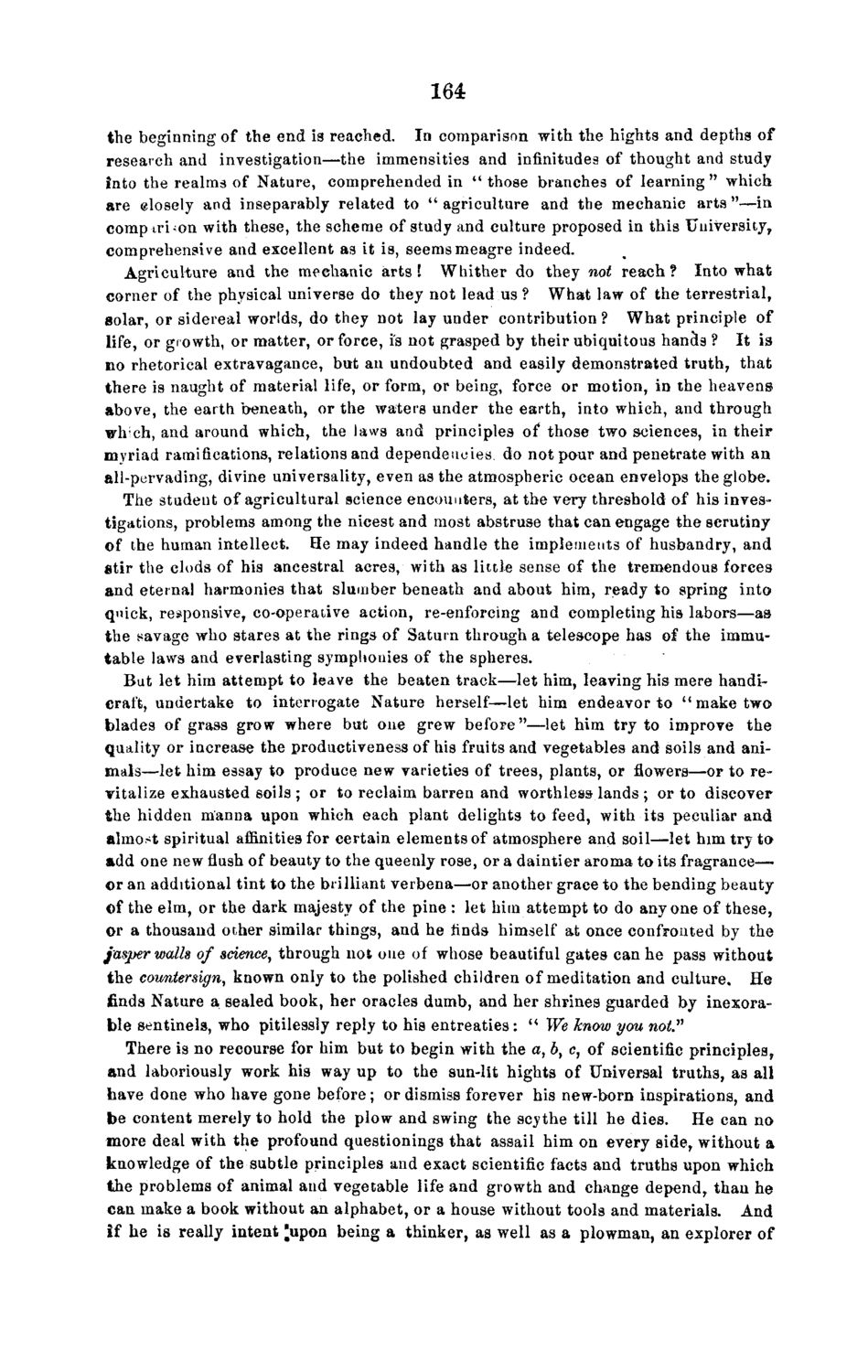| |
| |
Caption: Board of Trustees Minutes - 1868
This is a reduced-resolution page image for fast online browsing.

EXTRACTED TEXT FROM PAGE:
164 the beginning of the end is reached. In comparison with the hight3 and depths of research and investigation—the immensities and infinitudes of thought and study into the realms of Nature, comprehended in " those branches of learning" which are elosely and inseparably related to " agriculture and the mechanic arts "—in comp tri-on with these, the scheme of study and culture proposed in this University, comprehensive and excellent as it is, seems meagre indeed. Agriculture and the mechanic arts I Whither do they not reach? Into what corner of the physical universe do they not lead us ? What law of the terrestrial, solar, or sidereal worlds, do they not lay under contribution ? What principle of life, or growth, or matter, or force, is not grasped by their ubiquitous liana's ? It is no rhetorical extravagance, but an undoubted and easily demonstrated truth, that there is naught of material life, or form, or being, force or motion, in the heavens above, the earth beneath, or the waters under the earth, into which, and through wh'ch, and around which, the laws and principles of those two sciences, in their myriad ramifications, relations and dependencies, do not pour and penetrate with an all-pervading, divine universality, even as the atmospheric ocean envelops the globe. The student of agricultural science encounters, at the very threshold of his investigations, problems among the nicest and most abstruse that can engage the scrutiny of the human intellect. He may indeed handle the implements of husbandry, and stir the clods of his ancestral acres, with as little sense of the tremendous forces and eternal harmonies that slumber beneath and about him, ready to spring into quick, responsive, co-operative action, re-enforcing and completing his labors—as the savage who stares at the rings of Saturn through a telescope has of the immutable laws and everlasting symphonies of the spheres. But let him attempt to leave the beaten track—let him, leaving his mere handicraft, undertake to interrogate Nature herself—let him endeavor to <c make two blades of grass grow where but one grew before"—let him try to improve the quality or increase the productiveness of his fruits and vegetables and soils and animals—let him essay to produce new varieties of trees, plants, or flowers—or to revitalize exhausted soils ; or to reclaim barren and worthless lands ; or to discover the hidden manna upon which each plant delights to feed, with its peculiar and almost spiritual affinities for certain elements of atmosphere and soil—let him try to add one new flush of beauty to the queenly rose, or a daintier aroma to its fragrance— or an additional tint to the brilliant verbena—or another grace to the bending beauty ©f the elm, or the dark majesty of the pine : let him attempt to do any one of these, or a thousand other similar things, and he finds himself at once confronted by the jasper walls of science, through not one of whose beautiful gates can he pass without the countersign, known only to the polished children of meditation and culture. He finds Nature a sealed book, her oracles dumb, and her shrines guarded by inexorable sentinels, who pitilessly reply to his entreaties: " We know you not.11 There is no recourse for him but to begin with the a, b} <, of scientific principles, ? and laboriously work his way up to the sun-lit hights of Universal truths, as all have done who have gone before; or dismiss forever his new-born inspirations, and be content merely to hold the plow and swing the scythe till he dies. He can no more deal with the profound questionings that assail him on every side, without a knowledge of the subtle principles and exact scientific facts and truths upon which the problems of animal and vegetable life and growth and change depend, than he can make a book without an alphabet, or a house without tools and materials. And if he is really intent Jipon being a thinker, as well as a plowman, an explorer of
| |